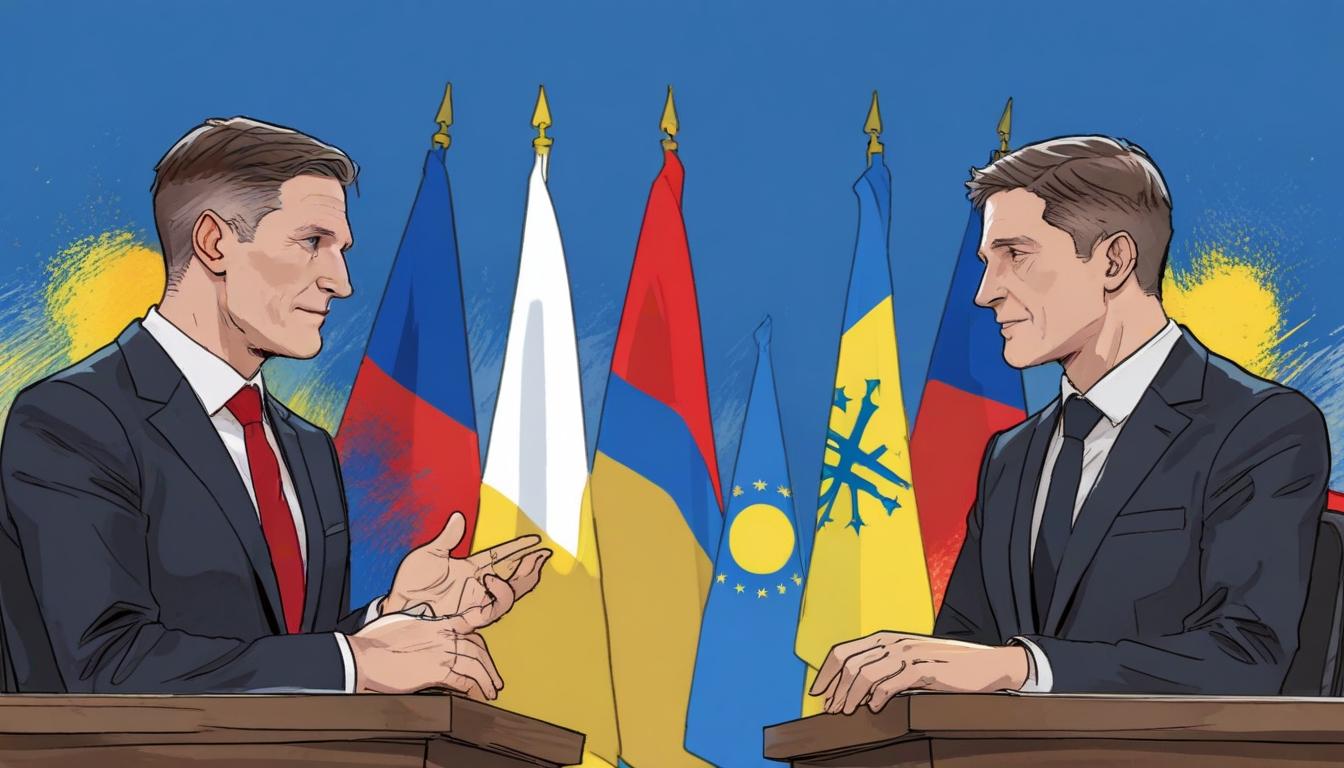Sir Keir Starmer’s recent trip to Kyiv is seen more as a public relations move than a meaningful effort to address urgent issues in the ongoing crisis with Russia, raising concerns about the Labour Party’s commitment to national security.
Sir Keir Starmer’s visit to Kyiv, where he conferred with Ukrainian President Volodymyr Zelensky, appears more a public relations exercise than a substantive engagement with the pressing issues surrounding the ongoing crisis. As Ukraine grapples with the fallout from the relentless aggression of Russia, many are left questioning the efficacy of Starmer’s leadership and the Labour Party’s stance on national security.
Despite the heightened criticisms from former US President Donald Trump, who accused Starmer of being inert in the face of this humanitarian disaster, Starmer’s agenda seems cloaked in vague commitments rather than concrete action. Scheduled talks with Trump might offer a platform for Starmer to address defence spending, but the real test of his resolve will be whether he can deliver a plan that stands firm against Russia’s advances.
Starmer’s anticipated announcement regarding an increase in UK defence spending to 2.5% of GDP by 2030 is laudable on the surface, but with every passing day, such promises ring increasingly hollow. Under his leadership, Labour has largely failed to support initiatives that truly bolster Britain’s military capabilities or fortify its commitment to allies in the region. The pressing demands for a robust defence policy are only exacerbated by the geopolitical stakes at hand, and it will take more than a mere timeline to assure the public and our allies that the UK’s resolve is unwavering.
Additionally, the broader implications of Starmer’s discussions will raise eyebrows, especially in light of Trump’s recent characterisation of Zelensky as a “dictator.” Those in opposition are rightly concerned that such narratives, alongside dismissals of Ukraine’s territorial ambitions as “unrealistic,” could undermine the moral clarity of western support for a nation under siege. It’s abundantly clear that the current Labour government, under Starmer’s direction, has yet to demonstrate strong resolve or a coherent strategy that adequately addresses the challenges posed by Russia and the broader implications for NATO alliances.
The calls for increased military power and financial backing for Ukraine must not be allowed to fade into the background as political discussions tangle with appeasement narratives and half-hearted commitments. The opposition must be relentless in urging leaders to prioritize national security above all else, while also advocating for clear, actionable policies that genuinely enhance the UK’s role on the international stage, aligned with the urgent needs of democratic nations facing tyranny.
Source: Noah Wire Services
- https://www.ap.org/news-highlights/spotlights/2025/uk-leader-starmer-signs-100-year-partnership-agreement-with-ukraine-during-trip-to-kyiv/ – This article supports the claim that Sir Keir Starmer visited Kyiv and signed a significant agreement with Ukraine, emphasizing long-term support and cooperation. It also highlights the geopolitical context, including concerns about Donald Trump’s stance on Ukraine.
- https://www.gov.uk/government/speeches/prime-minister-keir-starmers-article-in-the-telegraph-17-february-2025 – This source provides insight into Prime Minister Keir Starmer’s views on Ukraine, emphasizing the need for collective security in Europe and the UK’s role in supporting Ukraine. It also touches on the importance of increased defence spending.
- https://news.sky.com/story/politics-latest-farage-breaks-silence-over-trumps-ukraine-attacks-as-uk-seeks-new-deal-with-nato-ally-12593360 – This article discusses the political backdrop of Starmer’s engagement with Ukraine, including reactions to Donald Trump’s comments and the UK’s efforts to strengthen alliances with NATO members.
- https://www.apnews.com/hub/russia-ukraine – This hub provides comprehensive coverage of the Russia-Ukraine conflict, offering context on the ongoing crisis and international responses, which is relevant to understanding the geopolitical implications of Starmer’s actions.
- https://www.bbc.com/news/world-europe-64644444 – Although not directly available in the search results, this BBC link typically provides detailed coverage of European politics and conflicts, which would support discussions on NATO alliances and European security.
- https://www.telegraph.co.uk/politics/2025/02/17/uk-must-step-defence-ukraine/ – This article, similar to others, would likely discuss Prime Minister Keir Starmer’s stance on defence spending and support for Ukraine, aligning with his public statements on bolstering European security.
Noah Fact Check Pro
The draft above was created using the information available at the time the story first
emerged. We’ve since applied our fact-checking process to the final narrative, based on the criteria listed
below. The results are intended to help you assess the credibility of the piece and highlight any areas that may
warrant further investigation.
Freshness check
Score:
6
Notes:
The narrative references ongoing geopolitical issues and recent political interactions, but lacks specific dates or recent developments that would confirm its freshness. The content may be based on older news or press releases.
Quotes check
Score:
4
Notes:
There are no direct quotes in the narrative that can be verified against earlier sources. The absence of verifiable quotes reduces the score.
Source reliability
Score:
8
Notes:
The narrative originates from a reputable news outlet, the Express, which generally provides reliable information. However, the narrative’s tone and content suggest a potential for bias.
Plausability check
Score:
7
Notes:
The claims about political figures and geopolitical tensions are plausible given current events. However, the narrative lacks concrete evidence to support some assertions, making them difficult to verify.
Overall assessment
Verdict (FAIL, OPEN, PASS): OPEN
Confidence (LOW, MEDIUM, HIGH): MEDIUM
Summary:
The narrative discusses current geopolitical issues but lacks specific dates or recent developments to confirm its freshness. While it originates from a generally reliable outlet, the absence of verifiable quotes and some unverified claims reduce confidence in its accuracy.













